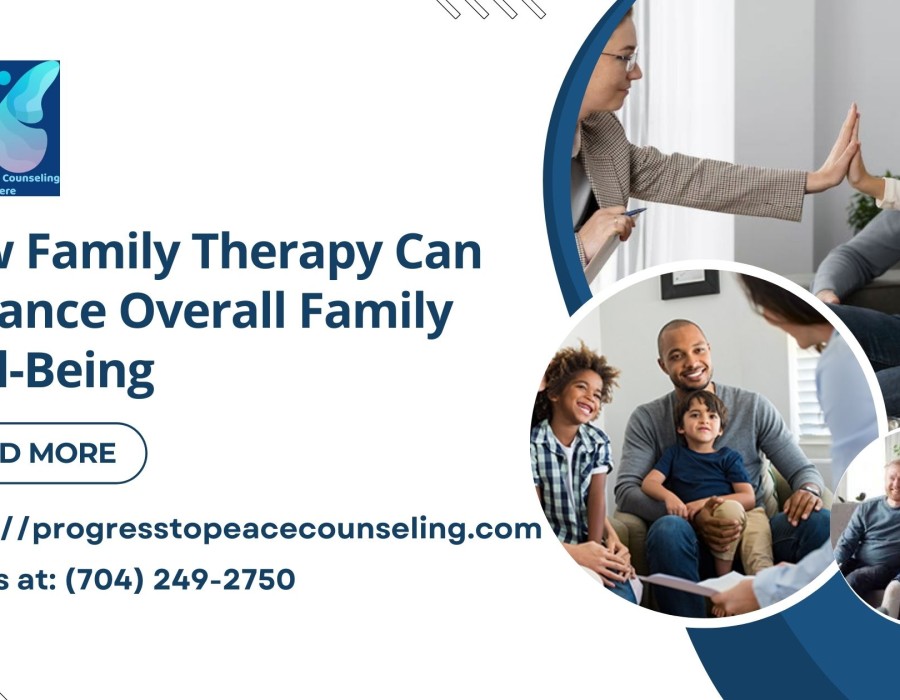Family is often considered the cornerstone of society, providing love, support, and a sense of belonging. However, even the strongest families can face challenges that strain relationships and impact overall well-being. Family therapy has emerged as a powerful tool to address these issues and promote healthier, happier family dynamics. If you are looking for a top rated family counseling therapist in Charlotte NC to enhance your overall family well-being, then you can count on the professional experts at Progress To Peace Counseling. In this article, we'll explore how family therapy can significantly enhance overall family well-being, examining its benefits, methods, and the positive changes it can bring to family life.
Understanding Family Therapy
Family therapy, also known as family counseling, is a form of psychotherapy that focuses on improving communication and resolving conflicts within the family unit. Unlike individual therapy, which concentrates on personal issues, family therapy views problems in the context of the entire family system. This approach recognizes that an individual's behavior and emotional well-being are intrinsically linked to their family relationships and dynamics.
The primary goal of family therapy is to strengthen family bonds, improve communication, and create a more harmonious home environment. Therapists work with families to identify dysfunctional patterns, address underlying issues, and develop healthier ways of interacting with one another.
Key Benefits of Family Therapy
Improved Communication
One of the most significant benefits of family therapy is its focus on enhancing communication between family members. Many family conflicts arise from misunderstandings, unexpressed feelings, or ineffective communication styles. Family therapists help members learn to express themselves clearly, listen actively, and understand each other's perspectives. This improved communication can lead to fewer conflicts and a stronger sense of connection within the family.
Conflict Resolution Skills
Family therapy equips families with valuable conflict resolution skills. Therapists teach techniques for managing disagreements constructively, promoting compromise, and finding win-win solutions. These skills not only help resolve current issues but also provide a framework for addressing future conflicts, leading to long-term family stability.
Enhanced Emotional Intelligence
Through family therapy, members often develop greater emotional intelligence. This includes improved self-awareness, empathy, and the ability to regulate emotions. As family members become more attuned to their own feelings and those of others, they can respond more compassionately and effectively to each other's needs.
Strengthened Family Bonds
By working through challenges together in therapy, families often experience a strengthening of their emotional bonds. The process of sharing vulnerabilities, supporting each other through difficulties, and celebrating progress can create a deeper sense of unity and belonging among family members.
Individual Growth Within the Family Context
While family therapy focuses on the family unit, it also promotes individual growth. Members often gain insights into their own behaviors and thought patterns, leading to personal development that positively impacts the family as a whole.
Adaptability to Change
Families face various transitions and challenges throughout their lifecycle, such as the birth of a child, adolescence, career changes, or the loss of a loved one. Family therapy helps families navigate these changes more smoothly by improving their adaptability and resilience.
Methods and Techniques in Family Therapy
Family therapists employ a variety of methods and techniques to address family issues:
- Structural Family Therapy: This approach focuses on changing the family structure to improve interactions and solve problems. It involves identifying and modifying dysfunctional patterns in family hierarchies and boundaries.
- Strategic Family Therapy: This short-term approach aims to solve specific problems by focusing on present interactions rather than past events. Therapists may assign "homework" to change family dynamics outside of sessions.
- Systemic Family Therapy: This method views the family as an interconnected system where each member's actions affect the others. It aims to understand and modify the family system to improve overall functioning.
- Narrative Therapy: This technique helps families reframe their personal and collective narratives, focusing on strengths and positive aspects rather than problems.
- Emotionally Focused Family Therapy: This approach emphasizes emotional bonds and attachment within the family, aiming to strengthen these connections to improve overall family functioning.
- Cognitive-Behavioral Family Therapy: This method focuses on changing negative thought patterns and behaviors that contribute to family problems.
Addressing Specific Family Challenges
Family therapy can be particularly beneficial in addressing specific challenges that many families face:
- Adolescent Behavioral Issues: Family therapy can help parents and teenagers navigate the often turbulent adolescent years, addressing issues such as rebellion, academic problems, or substance abuse.
- Marital Conflicts: By involving the entire family, therapy can address marital issues that affect children and overall family dynamics.
- Blended Family Challenges: Family therapy can help blended families navigate the complexities of merging different family cultures and addressing loyalty conflicts.
- Mental Health Issues: When a family member struggles with mental health issues, family therapy can provide support and coping strategies for the entire family.
- Grief and Loss: Family therapy can help families process grief together and support each other through difficult times.
- Addiction: Family therapy plays a crucial role in addressing addiction issues, helping both the individual struggling with addiction and the family members affected by it.
The Process of Family Therapy
Family therapy typically involves several stages:
- Assessment: The therapist gathers information about the family's history, current issues, and goals for therapy.
- Treatment Planning: Based on the assessment, the therapist develops a treatment plan tailored to the family's specific needs.
- Therapy Sessions: Regular sessions involve various activities and discussions aimed at improving family dynamics.
- Homework and Practice: Families often receive assignments to practice new skills and behaviors between sessions.
- Evaluation and Adjustment: The therapist continually assesses progress and adjusts the treatment plan as needed.
- Termination: As the family achieves its goals, therapy sessions are gradually reduced and eventually concluded.
Overcoming Resistance to Family Therapy
Despite its benefits, some families may be hesitant to pursue therapy. Common concerns include:
- Stigma: Some family members may worry about the perceived stigma of seeking mental health support.
- Fear of Blame: Individuals might fear being blamed for family problems in therapy sessions.
- Privacy Concerns: Families may be uncomfortable sharing personal issues with an outsider.
- Time and Financial Constraints: The commitment required for therapy can be challenging for busy families.
To overcome these barriers, it's important to emphasize that seeking help is a sign of strength, not weakness. Family therapy is a collaborative process aimed at improving family life, not assigning blame. Many therapists offer flexible scheduling and sliding scale fees to accommodate different family situations.
Long-Term Impact on Family Well-Being
The skills and insights gained through family therapy can have a lasting positive impact on family well-being. Families often report:
- Increased closeness and emotional intimacy
- Better problem-solving abilities
- Improved individual mental health and well-being
- Greater resilience in facing future challenges
- Enhanced ability to support each other through life's ups and downs
- A more positive and optimistic family atmosphere
Conclusion
Family therapy offers a powerful way to enhance overall family well-being by addressing challenges, improving communication, and strengthening emotional bonds. By providing families with the tools to navigate conflicts, adapt to changes, and support one another, family therapy can lead to more harmonious, resilient, and satisfying family relationships. While it requires commitment and effort from all family members, the long-term benefits of family therapy can be transformative, creating a solid foundation for individual and collective growth and happiness. Whether facing specific challenges or simply seeking to improve family dynamics, consider family therapy as a valuable investment in your family's well-being and future.
FAQs (Frequently Asked Questions)
Q: What is family therapy?
A: Family therapy is a type of psychotherapy that focuses on improving communication and resolving conflicts within the family unit. It involves working with multiple family members together to address issues affecting the family's well-being.
Q: When should a family consider therapy?
A: Families should consider therapy when facing persistent conflicts, communication breakdowns, significant life changes, or when a family member is struggling with mental health or behavioral issues that impact the entire family.
Q: How long does family therapy typically last?
A: The duration of family therapy varies depending on the family's needs and progress. It can range from a few months to a year or more. Some families may see improvements in 8-12 sessions, while others may require longer-term support.
Q: Will the therapist take sides or blame individuals?
A: No, a skilled family therapist remains neutral and does not take sides or assign blame. The goal is to understand family dynamics and help all members work together to improve relationships.
Q: Can children participate in family therapy?
A: Yes, children can and often do participate in family therapy. Therapists use age-appropriate techniques to involve children in the process.
Q: Is family therapy covered by insurance?
A: Many insurance plans cover family therapy, but coverage varies. It's best to check with your insurance provider about specific coverage details.
Q: What if one family member refuses to participate?
A: While it's ideal for all family members to participate, therapy can still be beneficial even if one member chooses not to attend. The therapist can work with the willing participants to improve family dynamics.
Q: How is family therapy different from individual therapy?
A: Family therapy focuses on relationships and interactions within the family system, while individual therapy concentrates on personal issues. Family therapy views problems in the context of the entire family unit.
Q: How can we prepare for family therapy?
A: Be open to sharing and listening, think about what you hope to achieve, and come prepared to discuss specific concerns or incidents that have been challenging for your family.
Q: Is what we say in family therapy confidential?
A: Family therapists maintain confidentiality within legal and ethical boundaries. However, since multiple family members are involved, it's important to discuss privacy expectations within the family.
Q: Can family therapy help with specific issues like addiction or mental illness?
A: Yes, family therapy can be very effective in supporting families dealing with addiction, mental illness, and other specific challenges by providing coping strategies and improving family support systems.
Q: How do we know if family therapy is working?
A: Signs of progress include improved communication, decreased conflict, better problem-solving skills, and a more positive family atmosphere. Your therapist will also regularly assess and discuss progress with you.
Q: Can family therapy be conducted online?
A: Yes, many therapists offer online family therapy sessions, which can be convenient for families with busy schedules or those living in different locations.






Comments